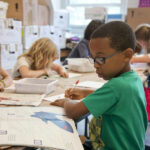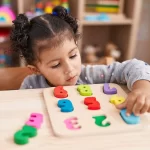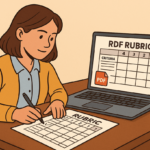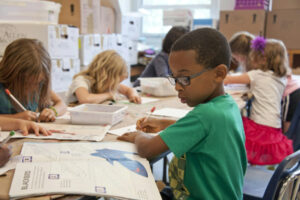Starting school early helps children develop language, social awareness, and self-help skills. Many parents begin this journey by enrolling their child in a Montessori playgroup in Singapore. Selecting the right one matters, especially with several options providing different learning philosophies and programmes. Understanding how pre-nursery differs from Nursery 1 in Singapore and how it connects to the Nursery 2 curriculum in Singapore supports a more informed decision.
What to Know About Pre-Nursery Education
Pre-nursery and Montessori playgroups in Singapore typically accept children aged 18 months to 2 years. Programmes vary, but most focus on promoting motor skills, early communication, and sensory learning through guided play. Children begin interacting with peers, following routines, and exploring through touch and movement. Educators use simple activities like storytelling, music, block play, and painting to build cognitive and emotional engagement.
Class sizes in pre-nursery remain small, ensuring more attention and care. Safety, hygiene, and nurturing environments remain the top priority at this stage. Unlike formal schooling, pre-nursery doesn’t rely on academic outcomes. Instead, teachers encourage expression, curiosity, and exploration. A consistent routine provides structure, helping children feel secure and more confident.
Parents considering pre-nursery should observe the teaching approach. Schools following Montessori methods, for example, encourage independence from an early stage. Others focus on bilingual exposure or thematic play. Select a school that supports your parenting goals and complements your child’s temperament.
Transitioning to Nursery 1 in Singapore
As children reach the age of 3, they move on to Nursery 1 in Singapore. This level builds on the foundation laid during pre-nursery, placing greater emphasis on structured learning while keeping activities age-appropriate. Class time becomes more organised, though it still revolves around discovery and play.
Nursery 1 introduces basic literacy and numeracy. Children start recognising letters and sounds, counting objects, and following step-by-step instructions. Lessons help improve attention span, listening, and cooperation. Circle time, songs, and storybooks promote language and early comprehension. Children also practise sharing, queuing, and expressing feelings using words.
At this stage, parental involvement becomes more strategic. Teachers often share developmental milestones, so parents stay informed about progress. School activities may include mini performances, excursions, and hands-on learning tasks that involve family members. Observe how the school communicates with parents and integrates feedback.
Nursery 1 classes operate either as half-day or full-day programmes. Choose the schedule that fits your child’s stamina and daily routine. Some schools offer flexibility to switch between the two after observing your child’s adjustment.
What the Nursery 2 Curriculum in Singapore Covers
The Nursery 2 curriculum in Singapore serves children aged 4. It prepares them for kindergarten by reinforcing skills taught in Nursery 1. Children continue developing language and numeracy, but take on more responsibility for their learning. Classrooms become more engaging with science, art, music, and nature-based themes.
Language activities include storytelling, phonetic reading, and early writing. Maths tasks involve sorting, patterns, and basic measurement. Teachers introduce problem-solving games and logical thinking exercises. Fine motor skills sharpen as children practise holding pencils, cutting shapes, or stringing beads.
Social development remains essential. In Nursery 2, children work on group projects and are encouraged to express opinions politely. Emotional regulation and empathy receive greater attention. Teachers guide conflict resolution and offer structured routines for responsibility, such as clearing their snack area or managing personal belongings.
Curriculum planning varies across schools, so review timetables and themes. Schools that follow inquiry-based learning provide children with more autonomy and encourage critical thinking. Others adopt formal, structured learning to prepare children for Primary 1 expectations. Ensure that the curriculum suits your child’s interests and developmental stage.
Key Factors to Consider When Choosing a Pre-Nursery School
Choosing a Montessori playgroup in Singapore starts with identifying your priorities. Focus on four key areas: teaching philosophy, teacher qualifications, classroom environment, and communication with parents. Visit potential schools and observe teacher-child interaction. Warmth, patience, and responsiveness from educators shape your child’s school experience.
Location and travel time also matter. A long commute may affect energy levels and daily routines. Look for a centre with safe premises, clean classrooms, and age-appropriate materials. Ask how schools handle nap time, feeding, and toilet training. Review how staff respond to challenging behaviour or separation anxiety.
Explore how well the school prepares children for the transition to Nursery 1 in Singapore. Ask about developmental checklists, learning objectives, and feedback mechanisms. Consider whether the curriculum aligns with the expectations of future learning levels, especially if you have preferences regarding the Nursery 2 curriculum in Singapore.
Trial classes, open houses, or parent-teacher meetings offer insight into school culture. Choose a centre that prioritises your child’s well-being, encourages holistic growth, and communicates openly. Balance affordability with quality, but never compromise your child’s safety or engagement.
Looking for a well-rounded Montessori pre-school in Singapore? Start your child’s journey right by choosing a nurturing and enriching environment. Visit Brighton Montessori to explore how their pre-nursery programme supports early learning and development.












